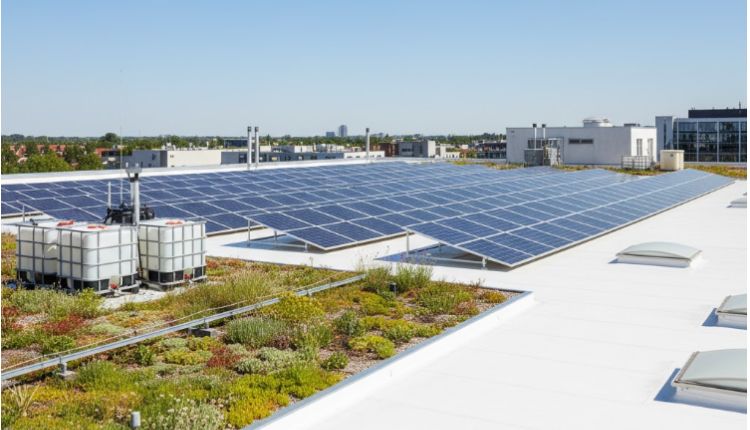Building a Greener Future from the Top Down
Sustainability has become more than just a trend it’s a movement redefining how buildings are constructed, maintained, and repaired. In Colorado, where weather conditions can vary from heavy snowfall in winter to intense summer heat, finding ways to make commercial roofing systems more energy-efficient and environmentally responsible is both a financial and ecological necessity. That’s where sustainable commercial roofing comes in.
This approach combines innovative materials, long-lasting design, and smart installation methods to help businesses cut operational costs while minimizing their environmental footprint. Whether you own a large warehouse, office complex, or retail building, understanding the impact and benefits of a sustainable roofing system can transform how your property performs over time.
What Is Sustainable Commercial Roofing?
At its core, sustainable commercial roofing refers to roofing systems designed with the environment and long-term performance in mind. Instead of using traditional materials that degrade quickly and require frequent replacement, these systems focus on durability, recyclability, and efficiency.
A sustainable roof not only protects your building from the elements but also helps regulate indoor temperature, improves air quality, and supports energy conservation. By using green roofing systems and eco-friendly commercial roofing materials, businesses can take a significant step toward reducing their carbon footprint while enhancing property value.
This type of roofing also incorporates advanced techniques such as cool roof technology, which reflects sunlight and lowers cooling costs. In Colorado’s fluctuating climate, where summers can be intense, this technology can make a noticeable difference in energy consumption.
If you’re exploring environmentally responsible roofing for your business, check out this guide to funding green commercial roofing to learn about sustainable financing options that make eco-conscious upgrades more affordable.
The Benefits of Sustainable Roofing for Colorado Businesses
1. Energy Efficiency and Cost Savings
One of the most notable advantages of sustainable roofing is its ability to reduce energy costs. Materials like reflective coatings and energy-efficient membranes help stabilize building temperatures by reflecting UV rays rather than absorbing them. This means your HVAC system doesn’t have to work as hard, lowering both energy use and utility bills.
Additionally, roofs built with sustainable roofing solutions tend to have longer lifespans, meaning fewer replacements and less material waste over time.
2. Environmental Impact
Colorado’s beautiful landscape is worth preserving, and commercial property owners play a role in doing so. Choosing recycled roofing materials or implementing green roof systems with vegetation can drastically cut down on stormwater runoff and pollution.
By reducing landfill waste and supporting cleaner production processes, sustainable roofs align perfectly with the state’s growing commitment to eco-friendly business practices.
3. Durability and Longevity
High-quality long-lasting roofing materials can endure the demanding weather conditions common across Colorado from high winds to heavy snow. Many sustainable roofs also require fewer repairs and less frequent commercial roof maintenance, helping businesses save money over time.
Durable materials such as metal, PVC, and TPO are excellent options that combine sustainability with resilience, ensuring your roof continues performing efficiently for decades.
Types of Sustainable Roofing Systems
There’s no one-size-fits-all solution when it comes to sustainability. The ideal choice depends on your building’s structure, budget, and environmental goals. Below are a few of the most common sustainable commercial roofing systems used in Colorado.
1. Cool Roofs
These systems use light-colored, reflective materials that bounce sunlight away from the building. This minimizes heat absorption and helps lower cooling expenses, especially during hot summer months. Many cool roofs use reflective roof coatings to achieve this effect.
2. Green Roof Systems
Green roofs are living roofs that feature soil and vegetation. They provide natural insulation, filter pollutants, and promote biodiversity in urban areas. While they require specialized installation, they’re a top-tier choice for businesses looking to go beyond basic sustainability.
3. Solar-Ready Roofs
A roof designed to support solar panels offers dual benefits energy production and efficiency. Combining solar panels with sustainable roof design ensures your building uses renewable energy effectively while maintaining roof integrity.
4. Metal Roofing Systems
Modern metal roofs are often made from recycled materials and can be fully recycled at the end of their lifespan. They are lightweight, durable, and energy-efficient, making them a strong contender for sustainable upgrades.
5. Reflective Coating Systems
Reflective coatings act as protective layers that improve a roof’s resistance to UV rays, weathering, and temperature fluctuations. They extend the roof’s life and help maintain energy efficiency without extensive structural modifications.
To learn more about environmentally smart roofing upgrades and installation support in Colorado, visit Strong Contractors.
Sustainable Roofing Design: Beyond the Surface
Sustainability in roofing isn’t just about choosing better materials it’s about creating systems that work harmoniously with a building’s design. For instance, roofs with higher insulation ratings can prevent heat transfer, reducing the need for excessive heating in Colorado’s colder months.
Design considerations also include proper drainage, efficient ventilation, and incorporating materials that minimize thermal expansion and contraction. When these factors are carefully integrated, a roof can maintain structural integrity for decades.
Sustainable roof design also considers the lifecycle of materials. Opting for products that can be recycled or repurposed minimizes waste and supports a circular economy a crucial element of true sustainability.
Why Sustainable Roofing Matters Now More Than Ever
Sustainable commercial roofing isn’t just a passing concept it’s becoming a standard for modern construction and business operations. Across Colorado, cities and counties are introducing incentives for environmentally responsible building practices, including green certifications and tax credits.
Businesses that adopt sustainable roofing aren’t just saving money; they’re building a reputation for environmental responsibility. This commitment can enhance your brand’s credibility, attract eco-conscious tenants, and even improve resale value.
Moreover, as climate patterns become less predictable, roofs that can adapt and perform under stress offer unmatched peace of mind. Investing in sustainability means investing in long-term resilience for both your property and your community.
The Role of Maintenance in Sustainability
Even the most eco-friendly roof won’t stay efficient without proper care. Regular inspections, timely repairs, and professional cleaning are all part of a sound commercial roof maintenance plan.
Using sustainable cleaning agents and maintaining proper drainage systems help extend the lifespan of your roof and preserve its energy-efficient properties. Many Colorado businesses are now adopting maintenance schedules that prioritize sustainability using biodegradable materials and preventive care instead of reactive repairs.
Conclusion: A Smarter, Greener Path for Roofing
Sustainable roofing is more than a construction choice it’s a conscious decision to balance performance, cost-efficiency, and environmental responsibility. By incorporating reflective coatings, recycled materials, and energy-efficient design, businesses in Colorado can lead the way toward a greener built environment.
From saving on operational costs to reducing environmental impact, sustainable commercial roofing represents the future of responsible building. And with options like green roofs, cool roofs, and reflective systems, there’s a solution to match every business’s goals.
FAQs About Sustainable Commercial Roofing
- How long does a sustainable roof last?
With proper maintenance, sustainable roofs can last anywhere from 30 to 50 years or more. Their durability often exceeds traditional roofing systems, making them a cost-effective long-term investment. - Can sustainable roofs handle Colorado’s weather?
Absolutely. Sustainable roofing systems are designed to withstand extreme conditions, including heavy snowfall, hail, and high UV exposure. Materials like metal, TPO, and reflective coatings perform particularly well in Colorado’s diverse climate. - Are sustainable roofs more expensive to install?
While the initial cost can be slightly higher, sustainable roofing systems save money over time through reduced maintenance, energy savings, and potential tax incentives. The long-term return on investment often outweighs the upfront expense.






